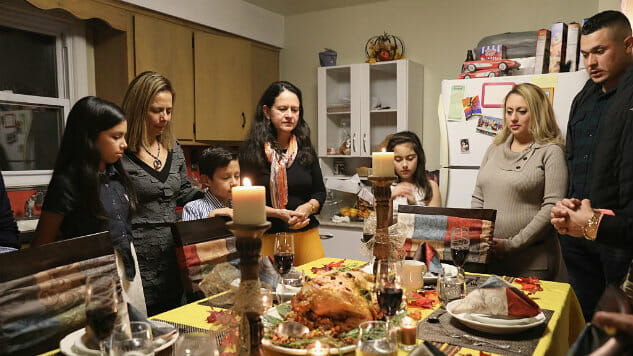We’re Having the Wrong Conversation About Food and Cultural Appropriation

A Central American immigrant family in Stamford prays before dinner. They expressed concern over President Trump, some saying their U.S.-born children fear the possibility their parents will be deported because of his policies. Image by John Moore / Getty
Okay, food media, chefs, restaurant owners and home cooks. I get it. Many of you keep saying you want to be able to cook whatever food you want, regardless of cultural appropriation. Set me free, you scream. I am in food chains! Look, no one is realistically going to be able to stop you from cooking whatever you want. No Cultural Appropriation Fairy is standing in your private kitchen, ready to bonk you over the head with her wand every time you cook from a cuisine you were not raised in.
But because of your emphasis on “having the right,” we keep having the wrong food and cultural appropriation conversation, over and over and over again, and to be honest, I’m tired of it. (And yes, I’m going to say “wrong,” because a lot of these attempts at cultural sensitivity are just really misguided.) The problem here is that people are trying to have this conversation in a vacuum, without a larger understanding or acknowledgement of the racial, ethnic and cultural capitalist power structure in America. Until you acknowledge that power and privilege structure, this conversation stays about cultural appropriation, and not food justice or food equal opportunity.
Cultural appropriation, in its strictest definition as the usage of elements of one culture by another culture, is not always (and often not) a bad action. I’ve written about this before, after #PhoGate went down.
Let’s talk about this, since some people are already mad at me.
I’m glad I can grab a cochinita pibil torta from Rick Bayless’ O’Hare Tortas Frontera during an unexpected 10-hour layover. (You probably don’t know how glad unless you are concurrently experiencing this same 10-hour layover.) Bayless’ food is pretty tasty. Hell, I’ll even have the Milanesa. That’s as “inauthentic” as you can get: crispy chicken, Jack cheese, pickled jalapeño, black beans, cilantro crema and tomatillo-avocado salsa. Sounds delicious. The Crispy McChicken was one of my favorite sandwiches growing up, and crispy chicken tastes texturally delicious on a plump torta with these Mexican-ish spicy ingredients.
And sure, Bayless has said some rather clueless stuff, like he never thought about his privilege (OMG), or that maybe he was the victim of reverse racism (LOL). But even though that’s part of the power structure I’m going to talk about, that’s not even the central point.
The point is that Bayless’ restaurant is the lucky one in the O’Hare Airport netting something like $7 a sandwich because he is a product of both his hard work and the privilege he received in our American environment. If you examine the cultural power structure of America (okay, the world) and (food) media in general, you’ll find that Bayless merely took every opportunity our culture offered to him, acted on it, exploited it, and worked hard to get even more advantages. His existing societal advantages helped him get more advantages. If you don’t understand how this works, read about the racial wealth gap.
It’s not that you can’t cook another culture’s food. It’s the lack of examination of the complex power structure that surrounds that appropriation that’s unsettling. There’s a pervasive lack of respect and deep cultural exploration that often goes hand in hand with cultural appropriation. There’s also an even more pervasive lack of activism in the food world against racial and ethnic discrimination. Let’s not pretend this is just about cooking food. It’s about money, power, agency and advancement. It’s about the blatant usage of intellectual and emotional labor sourced from developing nations in order to create capitalist profit in highly-industrialized nations.
So what I’m trying to say to you here is that this is not an individual problem, and it’s not just about cooking from another cuisine. “I must confess that I have trouble accepting this all-or-nothing mission to pry white chefs’ fingers from any dish not of their own culture,” Tim Carman recently wrote in The Washington Post.
No, no, no, no, no. Tim, let’s talk. That’s not what is going on. The Google Doc you mention that points folks to non-appropriative businesses is an attempt to bring some dollars back to communities of color. You’re pitting this as a fight between two Goliaths. It’s more like David and Goliath. Bayless will never lose his stature in the Mexican food community in America and will likely always own the most Mexican food businesses since he has such a huge head start; with a gajillion restaurants, book deals and friends in high places, his status in the culinary world is pretty secure. Business owners of color are just trying to get a little leg up. That’s not easy when it’s harder to get a business loan from the bank as a Black owner. Per Bloomberg, this bank loan difference applies to both Black and Latinx owners “even after controlling for characteristics like credit score or the type of business.”
-

-

-

-

- Curated Home Page Articles By Test Admin October 21, 2025 | 3:10pm
-

- Curated Home Page Articles By Test Admin October 21, 2025 | 2:57pm
- Urls By Test Admin October 21, 2025 | 2:57pm
- Curated Home Page Articles By Test Admin October 21, 2025 | 2:55pm
-

-

-

-

-

-

-

-

-

-

-

-

-

-

-

-

-

-

-

-

-

-

-

-

-

-

-

-

-

-

-




































